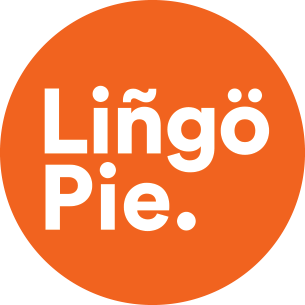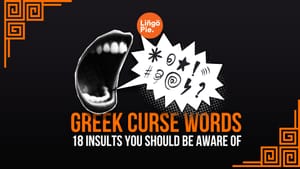The language of ancient philosophers, epic myths, and some of the world’s most beautiful islands. But as soon as you hear those winding words and unique letters, you might wonder, “How hard is it, really?” That little bit of doubt can stop many from taking the plunge.
In this post, I’ll break down how long it actually takes to learn Greek, what other languages share similarities with it, and the key factors that can speed up (or slow down) your progress. If you stick around, I'll also introduce you to how LOngopie can help you learn Greek!
- 18 Greek Curse Words And Insults You Should Be Aware Of
- What Is The Best Way To Learn Greek? Guide + Tips
- 6 Best Greek Language Apps For Beginners

How Long Will It Take You To Learn Greek?
According to the Lingopie Language Difficulty ranking and the Foreign Service Institute (FSI), Greek is a Category III language, meaning it’s moderately challenging for English speakers. Still, with consistent study and the right learning approach, you could reach solid proficiency in about 36 weeks.
On average, most learners reach basic survival Greek (A1–A2) in 4–12 months with about 100–120 hours of study. At this stage, you’ll know the alphabet, recognise signs, and handle everyday chats. To reach conversational Greek (B1–B2), expect 2–4 years of consistent practice or roughly 180–250 hours of structured learning.
Achieving advanced fluency (C1–C2), where you can discuss complex topics and follow native media, can take 4+ years and over 600 hours of dedicated study.

What Languages Are Close To Greek?
Unlike many European tongues, Greek is the only member of its branch in the Indo-European family. That means it doesn’t have direct “sister” languages like Spanish or French do. Still, a few languages share roots, grammar quirks, or borrowed words that can give you a small head start.
Historically and geographically, Greek has influenced (and been influenced by) its neighbours and trading partners. From ancient exchanges with the Mediterranean world to modern borrowings, these overlaps make Greek feel a little more familiar than you might expect.
Languages Related or Similar to Greek:
- Armenian – Morphology, syntax → Thought to be Greek’s closest relative due to possible shared ancient roots.
- Albanian – Grammar, shared roots → Some overlap in structure and vocabulary from centuries of regional contact.
- French – Vocabulary, influence → Many shared terms, especially through science, culture, and philosophy.
- Venetian – Lexical, historical → Borrowed words from old maritime and trade connections across the Aegean.
- Italian – Some vocabulary → Limited similarities, mostly through historical borrowings and shared Mediterranean culture.
And if you’re an English speaker, there’s another bonus — thousands of English words come from Greek, especially in medicine, science, and philosophy (think “biology,” “chronology,” or “democracy”). So even if the grammar feels new, the vocabulary might ring a bell.
Factors To Consider When Learning Greek
Your Language Background
Your native language and any other languages you already speak play a huge role in how easily you’ll pick up Greek. Since Greek is part of the Indo-European family, speakers of languages like German, Russian, or even Latin-based ones may recognise familiar grammatical structures, such as gendered nouns and verb conjugations. However, because Greek stands alone in its own branch, learners often find its sentence patterns and vocabulary quite distinct.
If you’ve studied another inflected language (one that changes word endings), you’ll have a smoother time understanding Greek’s case system and verb aspects. For complete beginners, it helps to focus on grammar early — not to memorise it mechanically, but to see how Greek sentences “fit together.” This awareness shortens the adjustment period dramatically.
Consistency Over Intensity
A few minutes of focused study each day does far more than a single long session on weekends. This is backed up by spaced repetition memory, while overloading information in bursts often leads to quick forgetting. Since Greek introduces a new alphabet and complex verb forms, frequent short sessions help reinforce both sound and structure naturally.
Try building Greek into your daily routine. For instance, dedicate mornings to vocabulary review and evenings to listening practice. Watching a 15-minute Lingopie episode with Greek and English subtitles every night can train your ear to distinguish sounds and phrases without feeling like formal study. Over time, these micro-habits compound into noticeable fluency gains.
The Greek Alphabet
At first glance, the Greek alphabet can look intimidating with its symbols that seem unrelated to English letters. But in reality, it’s a phonetic system, meaning words are spelled exactly as they sound. Once you learn its 24 letters, you can pronounce nearly any Greek word confidently. This early mastery gives learners a huge sense of progress and helps reading and listening comprehension grow in tandem.
The trick is to go beyond rote memorisation. Spend your first week reading simple Greek words aloud, even if you don’t know their meaning yet. Tools like Lingopie’s dual subtitles or beginner reading passages make this process more natural — your brain starts linking symbols, sounds, and meaning at the same time.
Immersion & Media Exposure

Nothing beats immersion for speeding up understanding. Hearing Greek in real contexts, like in music, films, and conversations, helps you internalise rhythm, tone, and natural phrasing far faster than textbooks alone. Even passive exposure trains your ear to catch recurring sounds and patterns, which research shows is key to developing listening fluency.
If you can’t live in Greece, digital immersion is the next best thing. Platforms like Lingopie simulate native environments by pairing real Greek shows with interactive subtitles and instant translations. You can pause, click on words, and add them to your personal vocabulary list. Combining that with Greek podcasts or YouTube channels fills your day with authentic input — and before long, Greek will stop sounding foreign.
Motivation & Real-Life Goals
Every long-term learner eventually hits a plateau. To get past it, it's important to clarify your goals and keep your motivation up. Studies show that learners with clear, personal reasons for studying a language stick with it much longer. Maybe you want to chat with Greek relatives, explore classical literature, or navigate Athens without switching to English. Whatever it is, connecting emotionally with your “why” keeps the learning journey meaningful.
Set specific, achievable goals tied to real situations — like ordering food, watching a Greek film without subtitles, or holding a 10-minute chat with a native speaker. Reward each milestone. Tools like Lingopie make this easy by letting you track your progress episode by episode.
What Can You Do To Learn Greek Fast (or Faster?)
The fastest way to learn Greek isn’t about grinding through grammar books — it’s about immersing yourself in the language every day. Surround yourself with Greek sounds, subtitles, and real conversations. Listening and reading together helps your brain connect words to meaning naturally, building fluency without feeling forced.
That’s where Lingopie makes learning feel effortless. By watching real Greek TV shows, movies, and podcasts with interactive subtitles, you pick up authentic vocabulary, pronunciation, and cultural context in one go. You can click any word to see its meaning, save it for later, and reinforce it through real dialogue — no flashcards needed.


![How Long Does It Take To Learn Greek? [Guide]](/blog/content/images/size/w1200/2025/11/How-Long-Does-It-Take-To-Learn-Korean.jpg)



![Commands In Spanish: A Definitive Guide For Beginners [2026]](/blog/content/images/size/w1200/2025/11/commands-in-spanish.jpg)
![How To Say I Love You In Greek Like A Native Speaker [GUIDE]](/blog/content/images/size/w300/2026/02/How-To-Say-I-Love-You-In-Greek.png)
![How To Say Happy New Year In Greek [Guide]](/blog/content/images/size/w300/2025/12/how-to-say-happu-new-year-In-Greek-1.png)

